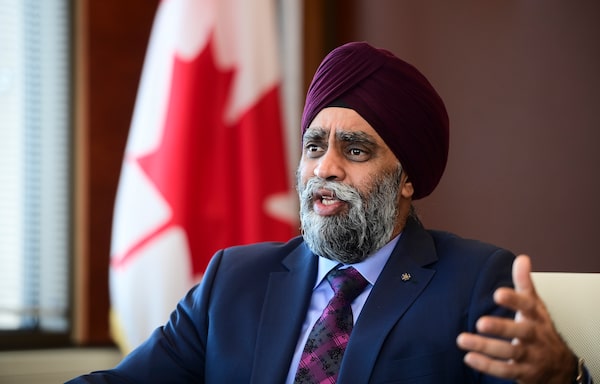
Defence Minister Harjit Sajjan takes part in a year-end interview with The Canadian Press, at the National Defence Headquarters, in Ottawa, on Dec. 17, 2020.Sean Kilpatrick/The Canadian Press
Defence Minister Harjit Sajjan worries incidents of extremism and hate in the Canadian Armed Forces are on the rise – and he says military commanders will be held accountable if the problem is not addressed.
Sajjan made the comments to The Canadian Press on Thursday as he launched a special advisory panel composed of former military members tasked with investigating how the Armed Forces can eliminate discrimination and hate from the ranks.
That follows a number of high-profile incidents in recent years that have raised concerns about the extent to which hate groups and right-wing extremists have permeated the ranks of the military, which is also dealing with more systemic discrimination.
Prime Minister Justin Trudeau said in a separate an interview this week that tackling hate and extremism will be a top priority for the new commander of the Canadian Armed Forces, who will replace outgoing chief of the defence staff Gen. Jonathan Vance.
Sajjan, who has previously spoken about his own experiences with racism as a member in the Canadian Army reserves before entering politics, said he “wholeheartedly agrees” with putting an emphasis on hate when naming the next defence chief.
“Given the fact that we are asking our people to do extraordinary, challenging things and very dangerous things, you want everybody to be working at their best,” he said.
“How can you work at your best if you feel that you’re not being treated fairly in your own institution?”
The federal Liberal government has stayed away from directly involving themselves in the military’s internal affairs in recent years, taking a largely hands-off approach to sexual misconduct and other issues, leaving them to the top brass to handle.
That was before a rash of incidents linking some service members to right-wing extremist groups and other hateful conduct, which coincided with growing concern in Ottawa about a rise in such incidents among the general Canadian public and elsewhere.
Trudeau’s emphasis on tackling extremism when asked about the qualities he is looking for in Canada’s next defence chief underscores the degree to which the Liberal government is concerned about the presence of extremists in the military.
Military commanders have in recent months issued orders forbidding such behaviour and warning of dire consequences should it persist. But that was only after years of assertions by the Armed Forces that such incidents were isolated in nature.
While Sajjan suggested the Canadian Armed Forces have come a long way when it comes to raising awareness about – and taking action against – racism and hate in uniform, he said he nonetheless thinks the number of such incidents has been on the rise.
“I feel that things have slightly increased,” he said. “But it doesn’t matter if it’s one or 10. When you have an incident like this, what I always question is: how could this happen inside our military?”
That is one of the questions being put to the advisory panel of former service members appointed by Sajjan, which has been tasked with coming up with recommendations on dealing with racists in the ranks – and preventing them from joining in the first place.
At the same time, “we’re going to be holding leaders to account,” Sajjan said.
“These incidents have to be dealt with very aggressively and we can’t stop until it’s not happening anymore. I just still find it shocking that is still taking place inside the Canadian Forces during this time.”
The past few years have seen a number of high-profile cases of alleged extremism in the Armed Forces, including one former Canadian Army reservist who was an alleged recruiter for a neo-Nazi group and is now in custody on firearms charges in the U.S.
The military is also investigating the 4th Canadian Ranger Group over concerns some members have ties to far-right groups.
One member was arrested in July after a truck was driven through the gates of Rideau Hall. He is accused of roaming while heavily armed near the residences of Prime Minister Justin Trudeau and the Governor General this summer.
Military intelligence has previously identified dozens of other active service members as belonging to hate groups or having made racist or discriminatory statements. While some have been forced from the military, others have been allowed to stay after being disciplined.
Know what is happening in the halls of power with the day’s top political headlines and commentary as selected by Globe editors (subscribers only). Sign up today.